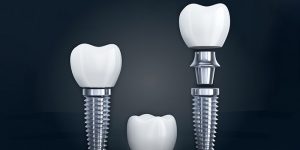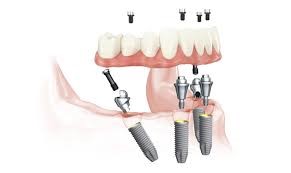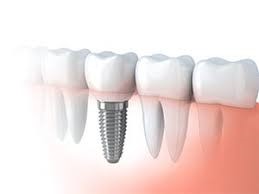Dr Rukman Jindal is an experienced oral & maxillofacial surgeon and a certified implantologist. she has a vast experience of over 18 years in various fields of dentistry.
Dental implants are the best treatment known to replace a lost tooth. It is ideal for people who maintain good oral health and have lost teeth due to injury or gum disease. Implants are screw-like materials that replace the root portion of a natural tooth. They are placed inside your jawbone by surgery over which crowns, dentures or bridges are fixed. If placed under proper conditions and further maintained diligently, implants can last for a lifetime.

A dental implant is needed to:
An ideal candidate for a dental implant is one who is in good general and oral health. You should have a good amount of bone height in order to place the implant and also healthy gum tissue.
The dental implant placement involves three stages:
The advantages of a dental implant over a dental bridge include:


Dental implants are close to your natural teeth and require the same home-care and regular dental visits. Brushing and flossing at least twice a day is recommended to keep the dental implant clean and free from dental plaque. Periodic follow-up visits are scheduled after your treatment to ensure the dental implant and gums are in a healthy condition.
Dental Implants are made of pure titanium. Titanium is bio compatible, meaning that our bone will fuse with the Implant.
How much discomfort should I expect after the Implant placement?
Discomfort usually is very minimal. The entire procedure is completed under local anesthesia. After the surgery, medications are prescribed for patient comfort and to prevent infection.
Dental Implants cannot get cavities because they are made up of metal. However, they are prone to gum disease which can be prevented with good oral hygiene.
Use a toothbrush with a small head or special inter-dental brush to clean the areas around the implant. This can be taken out, washed under running water and cleaned with a denture brush.Dental implants are close to your natural teeth and require the same home-care and regular dental visits. Brushing and flossing at least twice a day is recommended to keep the dental implant clean and free from dental plaque. Periodic follow-up visits are scheduled after your treatment to ensure the dental implant and gums are in a healthy condition
Implant Crowns are attached permanently and can only be removed by a professional.
Implant supported Dentures can be removed for cleaning of the Implants and the denture.
This will enhance the longevity of the dental Implant.
Are there any complications associated with placement of dental Implants?
Complications do exist but are rare. Most of these problems can be easily corrected.
• Dental Implants can fail to integrate with the bone and come out.
• Redness/ infection/ inflammation can arise in the soft tissue or bone due to bad oral hygiene.
Routinely, one must wait at least three months in the lower jaw and four to six months in the upper jaw before putting the final crown/ denture.
In selected cases where esthetic is a concern (mainly in the front teeth), a temporary crown can be placed on the day of the surgery.
In many situations, treatment can be completed on same day or next day.
Dr Rukman Jindal is an experienced oral & maxillofacial surgeon and a certified implantologist. she has a vast experience of over 18 years in various fields of dentistry.
Narain Hospital, 42, Manauli House, Jail Road,
Ambala City – 134003
Haryana – INDIA
Email :- info@ambaladental.com
Call for appointments: